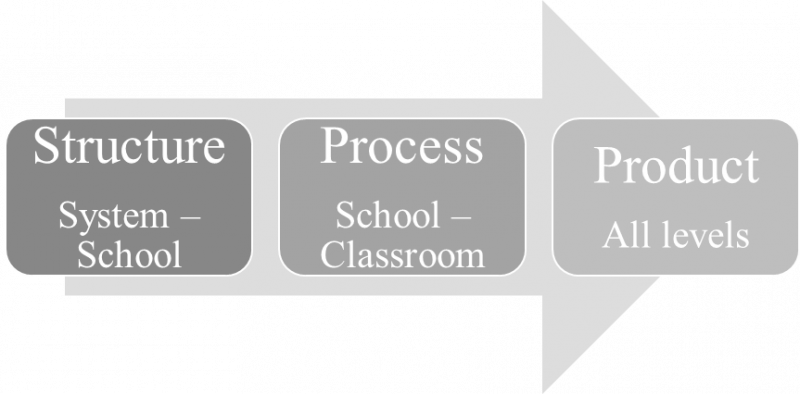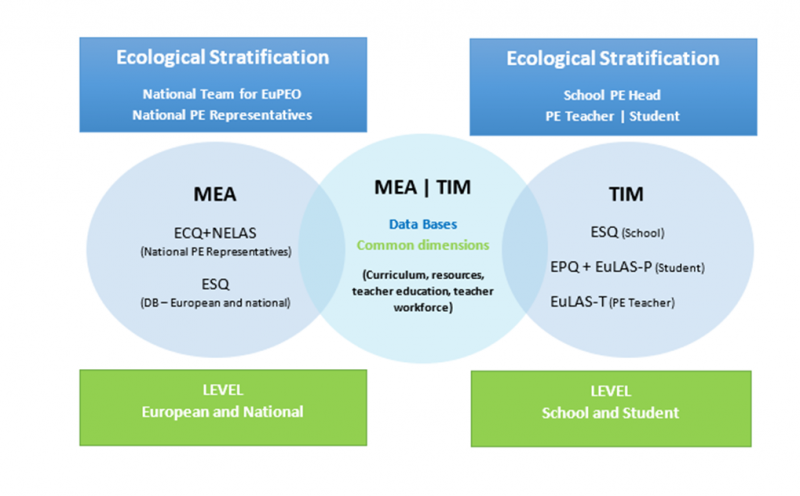Introduction
In the past years, the European Physical Education Association (EUPEA) investigated the quality of Physical Education (PE) and School Sport (SS) on several occasions from different perspectives, presented in the following as the antecedents of the European Physical Education Observatory project (EuPEO; Onofre et al., 2012a, 2012b; Onofre, Holzweg, Repond, Schmid & Scheuer, 2014; Scheuer & Holzweg, 2014). These antecedents listed below were based on several inspiring sources about indicators for Quality Physical Education (QPE) as a widely discussed topic:
-
Narrative literature review on categories of QPE indicators;
-
Statements from significant institutions and organizations;
-
The deliberations from the EUPEA seminar on QPE in cooperation with UNESCO;
-
Former EUPEA experience in European PE surveys.
When it comes to categories of QPE indicators, Scheuer and Holzweg (2014) identified three categories structuring the different factors in a narrative literature review and based on statements from significant institutions and organizations in the field of PE (figure 1):
-
Quality aspects in relation with input or human resources (structure);
-
Overlapping quality aspects linked to the context and to the process (process);
-
Quality aspects focused on outcomes or output and on objectives (product).
Figure 1: Impact levels of QPE categories (Scheuer & Holzweg, 2014, p. 64)
Further on, a seminar on the topic of QPE hosted by EUPEA at the UNESCO headquarter in April 2014 lead to a report describing the relevant aspects necessary for the implementation of QPE conceived as a multi-systemic phenomena implying the consideration of the previously described levels structure, process and product (Onofre et al., 2014). At the structure level, for example, QPE should be represented by (1) the use of systematic school PE advocacy for the society in general, policymakers, head teachers or school principals, and parents (individually, parents’ associations); (2) the formal clarification of the PE conceptual orientation in order to promote physical literacy and a healthy lifestyle based on physical activity and sport life-long; (3) the physical and emotional secureness of the school and its surroundings; (4) the presence of motivated and well-qualified PE teachers; and (5) a PE teacher education following clear qualification rules including initial, induction and in-service teacher education. At the process level, QPE needs to be characterized by (1) the presence of formal curricula proposals, offering content diversity and matching the local cultural; (2) PE lessons designed to improve a positive learning environment, the students’ understanding, the challenge for all students and the learners’ autonomy and responsibility; and (3) autonomously and regularly evaluated PE by teachers and students. At the product level QPE should be represented by the existence of formal and systematic PE learning assessments, mainly developed in a formative way and focused on PE related competencies (AIESEP, 2020; Onofre et al., 2014).
Finally, the main antecedent of the EuPEO project was a EUPEA survey implemented among the EUPEA member associations about the individual reality and collective desirability in PE and SS in Europe, the results of which were published in 2012 (Onofre et al., 2012a, 2012b).
In summary, these antecedents show that the situation in Europe with regard to QPE on the different levels of structure, process and outcome of PE remains very diverse. Further on, a lack of quality of different QPE indicators remains prevalent in many European countries. Thus, a European monitoring system with the contribution from the scientific community that is engaged in the field of PE to evaluate QPE on a regular basis is strongly needed. Hereby, EUPEA recognized the importance of implementing a systematic monitoring for PE as a European observatory by the means of the Erasmus+ funded project EuPEO, put in place and run in cooperation by the different, relevant stakeholders: PE researchers and PE practitioners
Methods
The European Physical Education Observatory project (EuPEO; www.eupeo.eu) funded by the Erasmus+ Sport programme reunites 12 partners from nine countries, including PE teacher associations and research partners (table 1), and aims to develop a Europe-wide PE monitoring system by developing the EuPEO webpage, a manual for external assessment (MEA) at Europe-wide and country levels, and a toolkit to prepare and provide internal self-monitoring (TIM) of quality PE and SS at the school level. In general, these two tools intend to provide a comparative view of QPE through common frameworks, tools and processes, while including as much as possible culturally sensitive conditions for QPE implementation, analysis, and decision-making.
The core dimensions of the EuPEO framework for QPE were primarily established with an explicit reference to the UNESCO (2015) Quality Physical Education Framework, which was then refined, expanded, and made explicit by the EuPEO team with regard to the respective subdimensions, categories and indicators. The EuPEO framework dimensions are: Curriculum Flexibility, Teacher Education, Teacher Workforce, Resources (Facilities, Equipment and Finances), Community Partnerships, and National PE Policy. Essential objectives for the EuPEO are:
-
To create and support conditions for National PE Observatories to develop and sustain through a cross-stakeholder collaboration, aligned to a common frame of reference with regards to core values of PE and common monitoring tools and processes across Europe;
-
To provide support for the National PE Observatories to collect evidence for comparative analysis in the respective countries that can inform on the status and progress of PE for all school-aged children and youth through social and political advocacy, and teacher professional development;
-
To create and support conditions for each School, Teacher and Student to self-monitor core dimensions of QPE;
-
To plan for the development of QPE, while creating a network of invested professionals that share practices, challenges and solutions for such development;
-
To share practices, challenges and solutions towards QPE primarily for all school-aged children and youth, but also for the school administration and staff;
-
To provide a longitudinal Europe-wide comparative analysis, every 3 years, on QPE so that each country has the opportunity to check their development with reference to similar European regions and countries.
Table 1: The European Physical Education Observatory project consortium
|
EuPEO Project consortium |
|
|
Project coordinator |
Faculdade de Motricidade Humana, University of Lisbon (Portugal) |
|
Project partners |
European Physical Education Association (Switzerland) |
|
Sociedade Portuguesa de Educação Física (Portugal) |
|
|
Willibald Gebhardt Institute (Germany) |
|
|
Deutscher Sportlehrerverband (Germany) |
|
|
Federal Institute of sport, Bern University of applied sciences (Switzerland) |
|
|
Swiss National Physical Education Association (Switzerland) |
|
|
Faculty of Sport, University of Ljubljana (Slovenia) |
|
|
Faculty of Physical Culture, Univerzita Palackého v Olomouci (Czech Republic) |
|
|
Hungarian School Sport Federation (Hungary) |
|
|
School of Education, University College Cork (Ireland) |
|
|
Associated partners |
Koninklijke Vereniging voor Lichamelijke Opvoeding (Netherlands) |
|
Mulier Institute (Netherlands) |
|
|
University of Münster (Germany) |
|
The initial general aim of EuPEO is to develop a European monitoring system for PE and SS, and its context of implementation (curricula, teacher training, logistics, learning outcomes, active school, active learning, etc.). As for EuPEO’s initial specific aims at the local, national, regional and European levels, they consist in the identification of the conditions of the implementation and outcomes of PE and SS as well the gathering of evidence to develop proposals and advocate for the improvement of QPE and quality SS. For this, there are needed (1) indicators for QPE, (2) a systematic process of data collection, analysis and feedback recommendations, as well as (3) the logistics (human resources and facilities) to assure the implementation of this process. The operational aims of the EuPEO project are mainly to develop the instruments, by identifying, collecting and integrating valid existing instruments (parameters, criteria, and procedures) to produce: (1) a Manual for External Assessment (MEA), for the external, system-wide evaluation, and; (2) a Toolkit for Internal Monitoring (TIM) for the internal, self-evaluation of the school (Figure 2).
Figure 2 : EuPEO Methodological Representation (Onofre et al., 2020, p. 5)
Results and discussion
In the construction and validation of these instruments, the MEA was developed as an open access methodological e-book to guide the data collection process to feed the observatory database. The TIM enables schools to monitor recommendations directly.
The MEA is a tool to be used by the EuPEO Coordination Team and by the National PE Observatory Coordination Teams to collate national data on QPE across all system layers (micro to macro) stemming from the EuPEO Country Questionnaire (ECQ) and the National External Learning Assessment System (NELAS), as well as the databases arising from the TIM (see below). With the collection of national data in a European database, the MEA provides the opportunity to analyse QPE indicators, both at the national level and at the European level, from a comparative and descriptive perspective. To allow such an approach, the tools in the MEA and the TIM were developed, tested, and extensively evaluated in two pilot iterations across the project partner countries. In doing so, the MEA does not seek to establish transnational standards and benchmarks for QPE. Instead, the MEA seeks to create meaningful opportunities for Europe and the European countries/national jurisdictions to dialogue with each other building on common data towards the increase and enhancement of the school-based QPE conditions, opportunities and outcomes, respecting the national sociocultural aspects that shape (and are shaped by) each country’s movement culture towards developing physically literacy among young citizens.
The TIM is a tool to be used by each participating school (with the respective Head of PE, PE teachers and PE students) and by the partnership between the EuPEO Coordination Team with the National PE Observatory Coordination Team to collate national data on QPE across all system layers (micro to macro) arising from the TIM, which includes: the EuPEO School Questionnaire (ESQ), the EuPEO Pupils Questionnaire (EPQ), the EuPEO Learning Assessment System – Teacher (EuLAS-T) and the EuPEO Learning Assessment System – Pupil (EuLAS-P). With the collation of school-wide data in a school database (linked to the National and European databases), the TIM provides the opportunity to analyse QPE indicators from a comparative and descriptive perspective. To allow such approach, the tools in the MEA and the TIM were developed, tested and extensively evaluated in two pilot iterations across the project partner countries.
Conclusion
The data analysed by EUPEA in recent years show that the situation in Europe with regard to the quality of PE on the different levels of structure, process and outcome of PE is quite diverse and a lack of quality of different indicators remains prevalent. This lets us conclude that a European monitoring system to evaluate the quality of PE and SS on a regular basis is necessary. To tackle this need, EUPEA launched together with 11 partners the EuPEO project under the lead of the University of Lisbon. With the EuPEO website, the MEA and the TIM, valuable instruments for the monitoring of QPE in Europe on both the system and school level were developed. Participation in the EuPEO is open to any interested PE stakeholders in any European countries.


